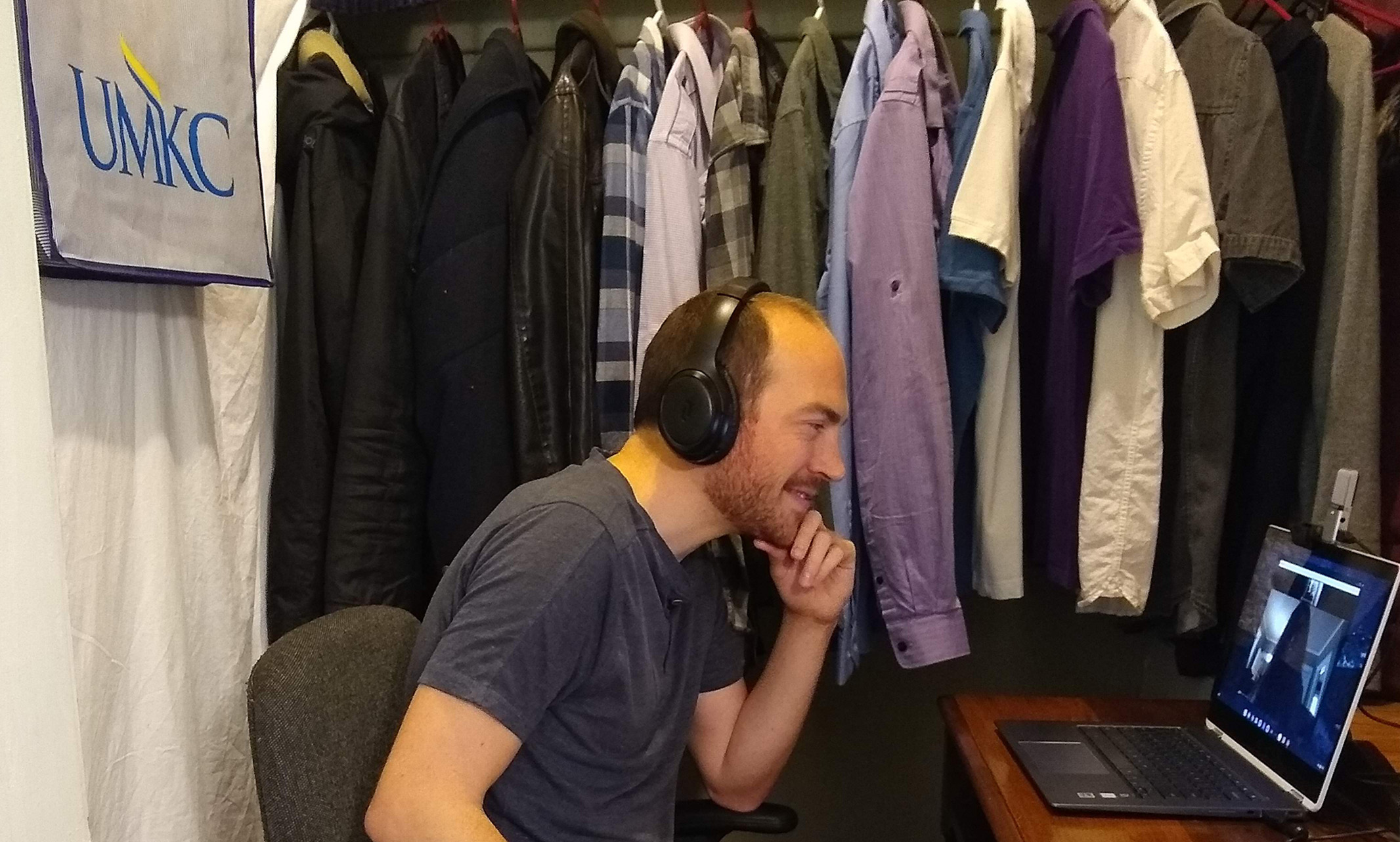What started as a podcast side project for UMKC faculty member Whitney Terrell, has now evolved into the first podcasting class at UMKC. In turn, the class has so far produced four thought-provoking, student-led podcasts.
Terrell teaches creative writing and in his spare time has a successful podcast called Fiction/Non/Fiction that he co-hosts with V.V. Ganeshananthan of the University of Minnesota. His podcast led Jennifer Phegley, the chair of the English Department, to approach him to gauge his interest in putting together a practicum on podcasting
“The department has always been interested in the digital humanities,” said Terrell. “With me already podcasting, it made perfect sense. And it has been super fun.”
UMKC students have interned for Terrell to help with his podcast, and the success of the internship was another contributing factor to starting the class. Still, Terrell said he and his students were in uncharted territory for the university.
“I’d never asked students to create a podcast from scratch in three months, so I really didn’t know whether we’d end up with something we’d want public,” said Terrell. “And when we got the final product I realized they were this good — we’ve got to get these out there.”
What they got were four unique podcasts. “Everything Genre” — produced by Harmony Lassen, Hunter Moseley and Abbey Outain — teases out the way TV shows use genre tropes. “Lit Adaptations” — produced by Jasmine Rollins, Sophie Straight and Kara Walters — analyzes the ways books are adapted into films. “MFA Insider” — produced by Jared McCormack, Giana Miniace and Montana Patrick — talks to MFA students across the country about their programs and work.
I started listening to their podcasts while I was jogging. I would get to the end of my run, finding myself just enjoying them and forgetting I need to be grading them as well.
All three podcasts can be heard on this website. There was a fourth podcast produced, by Eva June Narber, Summer Collins, and Beth Graham, that did investigative stories on human trafficking, but out of caution for the interview subjects the hosts decided not to make it public.
Terrell was blown away by the finished products. “I started listening to their podcasts while I was jogging,” he said. “I would get to the end of my run finding myself just enjoying them and forgetting I need to be grading them as well.”
McCormack plans to continue the MFA podcast, with a slightly different format rebranded as “MFA Writers” where he will be the sole host but continue to interview fellow MFA students from across the country. He sees it as a useful tool for potential MFA students and filling an untapped niche in the literary podcast space.
“There are a number of podcasts out there that I love that interview established writers about their process,” said McCormack. “I think it would be really interesting to do something similar but with emerging authors on the cusp of making it.”
One thing that hit home for Terrell was the advanced cultural commentary represented in “Everything Genre” and “Literary Adaptations.” “They were putting into practice the techniques that students learn in our creative writing and English programs,” said Terrell. “They were using the skills they’re picking up in the program, and I just love that.”
For the class, the students were divided into four groups, with each group coming up with their own podcast idea. The students were grouped by similar interests. In addition to their own podcast, the students were assigned duties on the Fiction/Non/Fiction podcast so they could practice sound editing and script writing ahead of tackling their own podcasts.
Jasmine Rollins, who worked on “Lit Adaptations,” thought the work on Terrell’s podcast was particularly eye-opening. “I was surprised at how quickly the turnover was from week to week,” she said. “Before the new episode is even up they’re already working on planning for the next episode.”
When it came to finishing production for the students’ podcasts, the class had to get creative because of the shutdown of the campus. They had planned to record and edit everything on campus with the help of a Communications professor, Angela Elam, and using audio software available in one of the computer labs.
Those best-laid plans were turned upside down. The students instead used Zoom to record their podcasts and managed to edit their audio with an any-means-necessary array of free (or free-trial) audio editing software. Terrell said he was amazed by the students’ determination to experiment and improvise to get to their finished products.
The plan is for Terrell’s spring semester Podcasting Practicum class (ENG 449C) to continue. Another podcasting course will be added in the fall in the Communications Studies Department (class #46784), taught by Elam, who is host of the “New Letters on the Air” podcast.
For McCormack, the experience was incredibly rewarding. ““I didn’t know anything about making a podcast before taking this class. This was a great way to get my feet wet learning from someone who is actually doing it,” he said. “You really see what all goes into making a podcast before you jump straight into it.”

